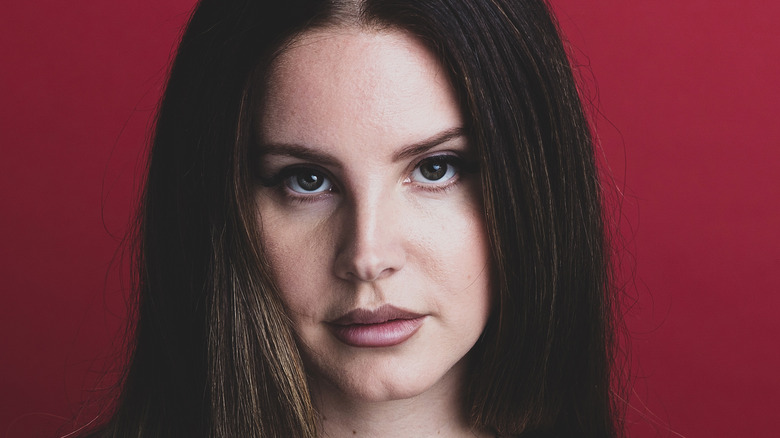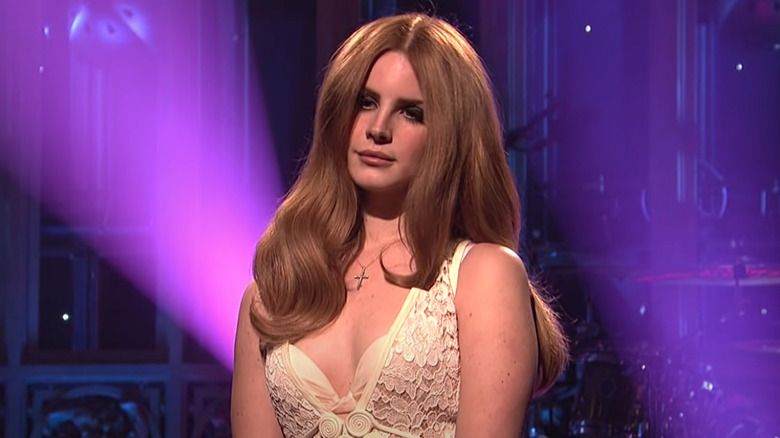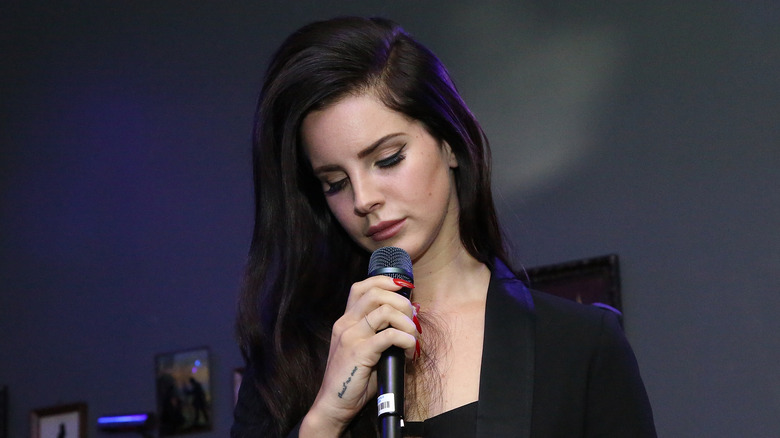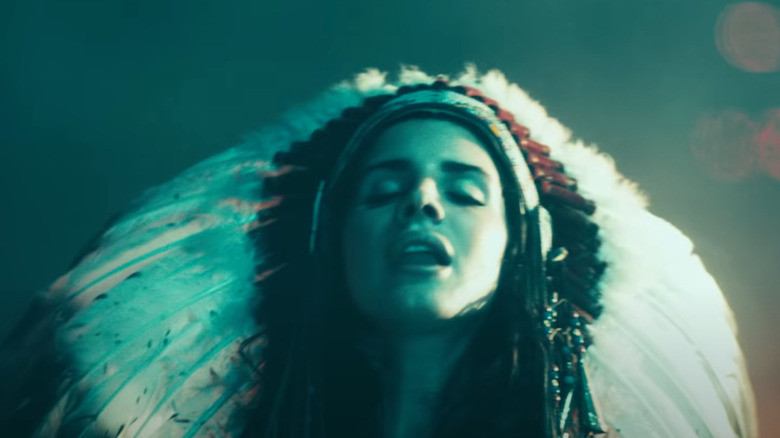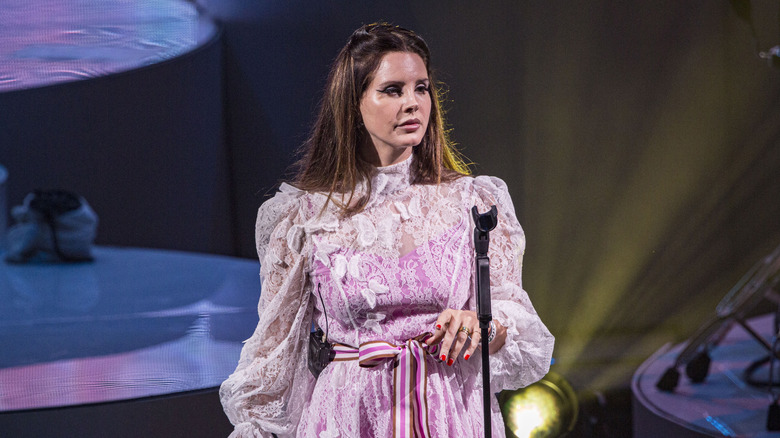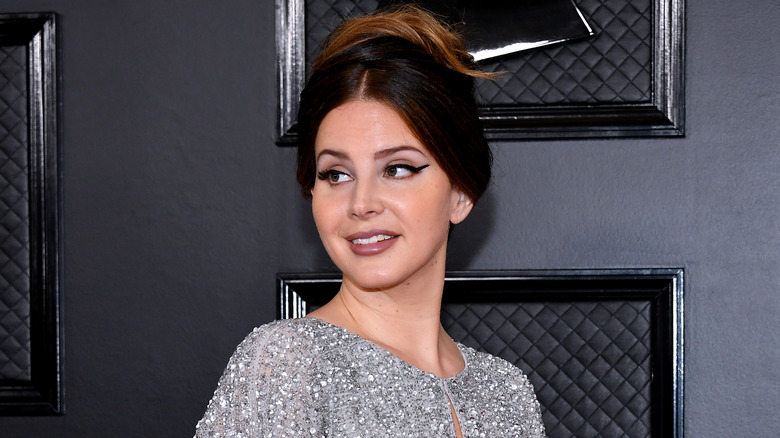Lana Del Rey's Biggest Flubs Of All Time
Controversy has always been integral to Lana Del Rey's brand. Back in 2011, the singer-songwriter's debut single, the love ballad "Video Games," sparked criticism for its submissive themes. As the public got more acquainted with Del Rey, her unapologetic lyrics, her striking aesthetics, and her unique performing style, it was clear that "Video Games" was just the beginning. Del Rey continued to sing about sex, violence, and death and to stay true to her vision, despite how much that vision may be seen as unsatisfactory or even offensive to some.
Still, Del Rey's unapologetic personality and unorthodox artistic output has seemingly helped to propel her career forward, rather than hindering it. Since the dawn of the 2010s, her music has given rise to a romanticized, dark, and dangerous mood in the contemporary pop scene. Though she is not one for marketable, bubblegum-pop, Top 40 radio hits, the singer has carved out a niche for herself that has welcomed a devoted, fervent fanbase and as much acclaim as criticism. And despite any lackluster performance, controversial social media post, or cringeworthy artistic decision, Del Rey has kept people talking, for better or for worse.
Here are some of the singer-songwriter's biggest flubs — though none has been big enough to dampen her career for good.
Lana Del Rey's 2012 SNL performance was deemed one of the five worst performances ever
In January 2012, rising star Lana Del Rey performed as the musical guest on "Saturday Night Live." Following her performance of her moody singles "Video Games" and "Blue Jeans," music critics and fans alike slammed her performance as being off-key and uncomfortable. In a leaked email to Gawker's Nick Denton, NBC News anchor Brian Williams wrote that Del Rey's performance was "one of the worst outings in SNL history" (via Reuters).
"Just watched SNL," gossip columnist Perez Hilton wrote on Twitter (via Reuters). "Not only was @LanaDelRey vocally WAY off, but watching her utter lack of stage presence was cringe-worthy. #DontBuyTheHype."
In a 2019 conversation for Rolling Stone, Sir Elton John defended the performance while speaking with Del Rey herself. "You came through that awful thing in that 'Saturday Night Live,'" he said. "Which was so distressing for someone like me to see someone so crucified. I've watched it, and it wasn't that bad!"
"It wasn't terrible," Del Rey agreed. At the very least, the performance was a memorable one among fans and critics alike, worthy of becoming a meme and earning "SNL" infamy, as USA Today deemed the performance one of the show's five worst musical performances ever.
Lana Del Rey has been accused of glorifying violence and premature death
Lana Del Rey's music and visuals have historically been laden with "damsel in distress" and "bad boy" themes. The cover for her 2012 single "Blue Jeans," for example, featured Del Rey lying poolside with a tattooed hand around her neck. Feminist site Jezebel responded with an op-ed titled: "Lana Del Rey's 'Controversial' New Single Cover Is Just Boring."
Two years later, in a 2014 interview with The Guardian, Del Rey solemnly declared, "I wish I was dead already," and answered in the affirmative when the interviewer asked if she thought early death was "glamorous." Del Rey's live-fast-die-young ethos caught flack from Kurt Cobain's daughter, Frances Bean Cobain. "The death of young musicians isn't something to romanticize," she wrote in a now-deleted tweet (via Billboard). "I'll never know my father because he died young and it becomes a desirable feat because people like you think it's 'cool'."
While the themes of her music have become arguably tamer over the years, Del Rey was still defending herself against accusations of "glorifying violence" years later. "I'm fed up with female writers and alt singers saying that I glamorize abuse when in reality I'm just a glamorous person singing about the realities of ... emotionally abusive relationships," she wrote in a message posted to Instagram in May 2020.
Despite her music not being totally mainstream radio-friendly, Del Rey manages to remain one of the major artists of the last decade — perhaps because she brought a previously rare darkness into the mainstream pop music scene.
Lana Del Rey was also accused of cultural appropriation
In 2012, Lana Del Rey appeared in a Native American headdress in the music video for her single "Ride," sparking backlash for appropriating native culture. The following year, Del Rey released a 27-minute short film, "Tropico," to accompany her album "Born to Die: Paradise Edition." In the video, the singer appears with teardrop tattoos on her face, surrounded by Latinx extras dressed up like gangsters. Feminist site Jezebel published an op-ed in response, titled: "Dear Lana Del Rey: You Are Not a Latina Gangsta Girl, So Cut the S**t."
Del Rey defended herself in a 2014 Maxim interview. "I live in East L.A., and I speak Spanish," she said. "The girls who work in the club in the video are my friends, people I knew before I became a little more well known. Like, I've always spoken Spanish in all my songs the past few years. So for me, personally, it's not a far-out-there reference."
In the resulting article, Maxim journalist Ian Daly pointed out that Del Rey only spoke Spanish in a few of her many songs, and that she did not live in or "anywhere near" East Los Angeles. Thankfully, Del Rey's Latinx appropriation phase appeared to be a thing of the past upon the release of her following album, "Honeymoon."
Lana Del Rey once said that 'the issue of feminism is just not an interesting concept'
Lana Del Rey's lyrics have long been accused of being anti-feminist due to their submissive themes, arguably outdated gender roles, and hints at male-on-female violence. The singer was questioned about her thoughts on feminism during a 2014 interview for Fader, which only fueled these accusations further.
"For me, the issue of feminism is just not an interesting concept," Del Rey said. "I'm more interested in, you know, SpaceX and Tesla, what's going to happen with our intergalactic possibilities. Whenever people bring up feminism, I'm like, god. I'm just not really that interested." She added, "My idea of a true feminist is a woman who feels free enough to do whatever she wants."
Following some online outrage at these comments, Del Rey clarified her position in a 2015 conversation with James Franco for V Magazine. "The luxury we have as a younger generation is being able to figure out where we want to go from here, which is why I've said things like, 'I don't focus on feminism, I focus on the future,'" the singer said. "It's not to say that there's not more to do in that area. I've gotten to witness through history the evolution of so many movements and now I'm standing at the forefront of new technological movements. I'm not undermining other issues."
Lana Del Rey's 'question for the culture' Instagram post prompted accusations of racism
In May 2020, Lana Del Rey took to Instagram to vent about some of the criticisms that have been hurled at her throughout her decade-long career. The message included references to accusations of the singer "glamorizing abuse," clarification that she was "not not a feminist," and a suggestion that her darkness allowed other female artists to "stop putting on a happy face."
"I just want to say it's been a long 10 years of bulls**t reviews up until recently and I've learned a lot from them," Del Rey wrote. But the message ironically went on to spark more controversy, most likely because Del Rey's statement that other female artists "have had number ones with songs about being sexy, wearing no clothes, f**king, cheating, etc," with five of those six women she listed being women of color.
"Don't ever ever ever call me racist," Del Rey wrote on Instagram in response to criticism of the post (via BBC). "The singers I mentioned are my favourite singers so if you want to try and make a bone to pick out of that, like you always do be my guest ... It doesn't change the fact that I haven't had the same opportunity to express what I wanted to express without being completely decimated."
Still, the controversy did not stop Del Rey's next album, "Chemtrails Over The Country Club," from becoming her seventh Top 10 album in the United States and garnering widespread critical acclaim.

